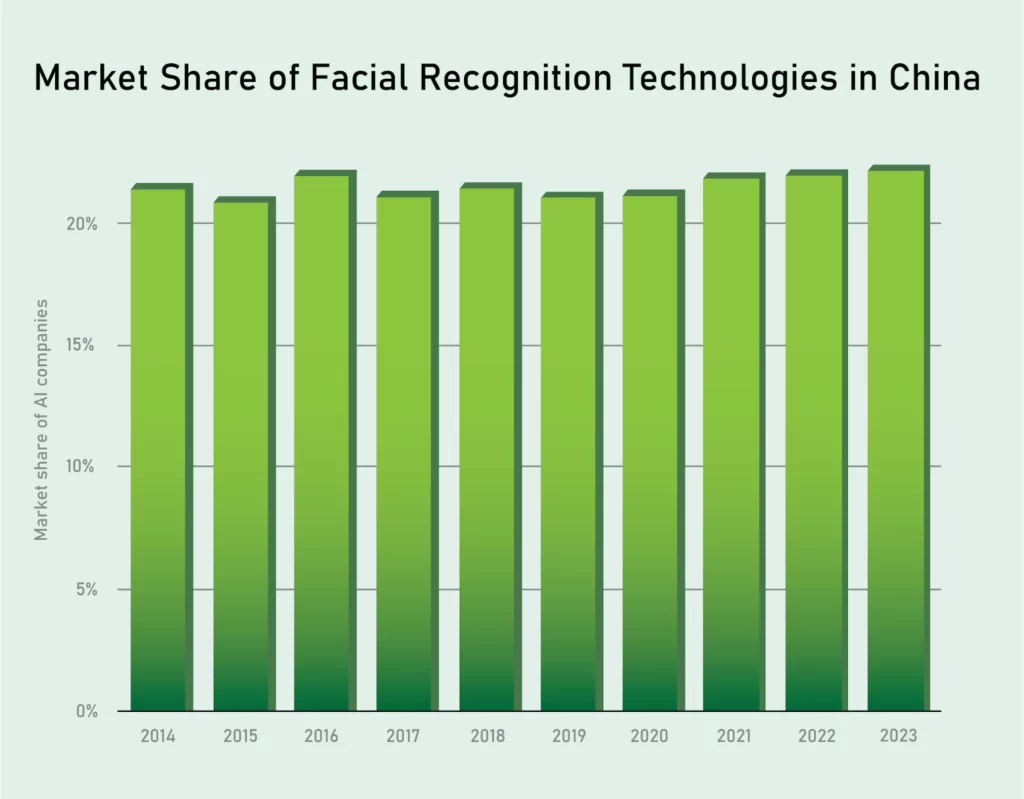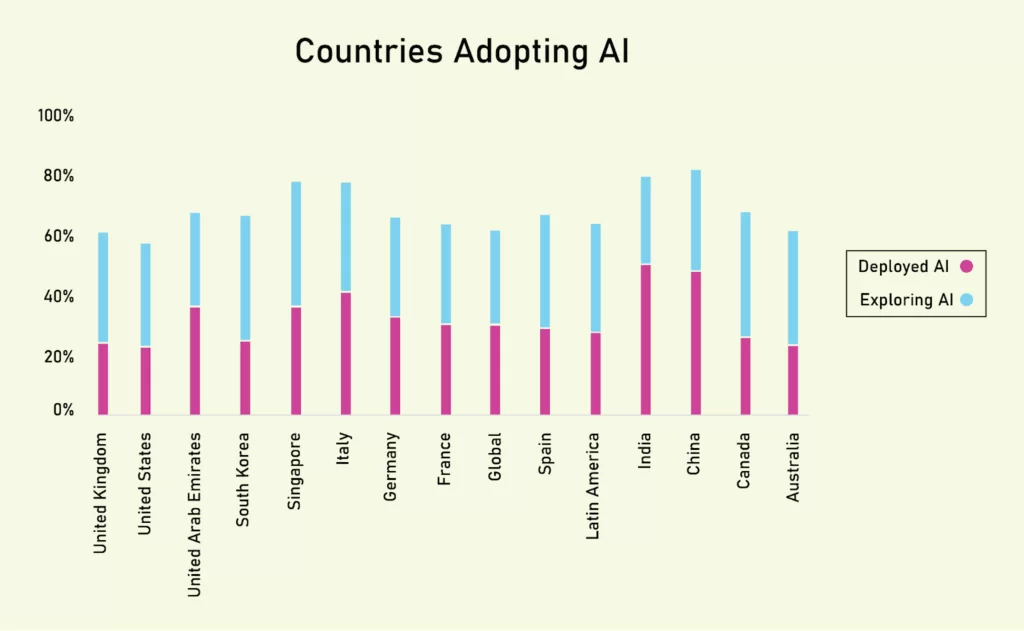When a new idea or technology becomes available and shows promising usage, powerful governments run to grasp the technology and take advantage of being early adopters.
And why not? World economics works that way. The more resources and technological advancement a country has, the more influential and rich it becomes.
Today, it is about AI. Artificial intelligence, in its various forms, has promised an overall cost-benefit despite the high initial investment. It is why only wealthy countries can afford to bring AI into their systems, which can potentially widen the gap between richer and poorer countries.
For instance, AI adoption in automobiles is a big bet. It won’t be long before we see the widespread commercialization of self-driving or flying cars.
Artificial Intelligence in Education
The Ed-Tech industry has agreed with artificial intelligence amiably. The use of artificial intelligence to make learning more accessible, engaging, and advanced is our personal favorite.

Students are already comfortable with technology, and they are more curious to make friends with anything more advanced that might come up.
The Ed-Tech space is so vast that it can encapsulate almost every aspect of education, including curriculum development, lesson delivery, and assessments. The VR sets, merge cubes, augmented reality mobile apps, etc., all give amazing augmented reality and learning experiences.

A merge cube showing parts of the human body through the Mr. Body app. Source.

Students can learn about the universe and solar system using a virtual reality set.
China, Technology, and AI
It is no news that countries have used various methods to come up as the top power in the world. Earlier it was only muscle power with higher investments in manpower, arms, and ammunition. Now, technology is the new power weapon in this new era of computers and robots. So, countries have been leveraging this soft power to make themselves global power leaders, making other countries reliant on them.
Harvard Professor of Economics, David Yang, recently enlightened us about the US ranking of the top companies with the most accurate technology in facial recognition. Out of nearly 50 companies, the top five were Chinese companies.

The graph demonstrates the percentage distribution of Facial Recognition Technologies in China.
China has been making tremendous and aggressive investments in digital technology, focusing on creating outstanding AI infrastructure to compete with other more significant economies like the US.
China is already ahead in many areas, which is a no-brainer. The most used app in the world is TikTok, and the Chinese are the majority of smartphone users worldwide.

China-based TikTok has been the most used application in the United States.
A renowned think tank, the Australian Strategic Policy Institute, discovered that China leads in 37 out of 44 technologies, including hypersonics and electric batteries, and also leads the US in AIgorithms, machine learning, and many more.
China and Ed-Tech Lead
Like any other sector, China also wants to lead in implementing education technology. They want to upskill their citizens with the latest and best knowledge to take a global lead in economic development.

Many recent developments point toward this thought. China’s Zhejiang has already introduced artificial intelligence into school curriculums and made it a compulsory subject. It is also learned that the city plans to create nearly a thousand AI experimental schools by 2025.
The Chinese have also been experimenting with various tech-based products in classrooms, like the brain wave tracker, which tracks distractions. In 2019, a primary school experimented with the product and faced backlash as the headband was used to track the engagement levels of students. The report was directly used to go on the computers of teachers.
The Chinese have also been experimenting with students’ engagement levels and their behaviors, like checking phones or yawning in classrooms. This has been done with parents’ consent to research the use of AI in education.

A still from the video that shows AI experimentation in Chinese classrooms.
With these research exercises, China’s way to leading into the Ed-Tech space with the advanced use of AI is clear.
Indulging in Artificial Intelligence to Improve Education
China seems ahead and determined to improve its educational space by leveraging AI, big data, and cloud computing. We have been reading about how China has set up vocational training schools that use AI to capture students’ behavior and teachers’ teaching styles. This information is later used to improve the teaching styles of educators.

The integration of AI has occurred progressively in different countries, with China leading the way, followed by India and Singapore. Information Source: IBM
An article published last year talks about how China uses AI to reduce the educational gap within the country. It also mentions that over half the Chinese labor force needs a high school degree.
You may also like to read: Influencing the Future of Education with AR/VR The country has boosted many AI-based technology startups to aid the education sector. The country’s major focus on building AI infrastructure, as disclosed by the Chinese State Council, is to become the world’s top AI innovation center by 2030.
Why China may lead in AI Implementation in Education
The Chinese government is authoritarian and may not think twice before using AI technology that might compromise the privacy of the citizens. So, it has been open to widely experimenting with AI products like AI-based cameras that capture student behavior in classrooms and help teachers and parents to improve student grades.

According to The Guardian, 48.49% of the world’s high-impact research papers were published in China in the past five years. Source.
The government has supported the firms bringing AI-based products that can disrupt education or promote them with financial incentives, infrastructure, research grants, resources, etc. China may lead in AI implementation in education because:
- China is a competitive economy and has made an aggressive moves in almost all sectors to assert its world dominance. China holds the manufacturing units of many high-worth companies. It has pushed its country’s sportspersons to train from a very young age and bring as many Olympic medals for the country as possible. AI would be no exception as well. The country has been leading in publishing AI-based research papers.
- The Chinese education system is organized at the centralized nature of policy-making. It is unlike free democracies, where privacy concerns and citizen discretion are given prime importance and can be questioned. Therefore, it is also about the country’s overall development rather than success in merely one sector.
All that Glitters is not Gold
Just because China has been vastly open to accepting AI implementation and experimentation in its country does not guarantee that it is leading the world. The country still faces a shortage of qualified teachers and established AI labs.
The pace of including AI in education is more straightforward in China because the country already collects a large pot of citizen data. One of the concerns shared by David Yang, Associate Professor of Economics at Harvard, is that this AI technology that might develop in China to understand people’s behavior may be exported heavily and used by other countries to accelerate their autocratic rule.
‘AI is fundamentally a technology for prediction”, he says.
Therefore, autocratic countries would always be the first ones to grab hold of these technologies that allow them to have maximum control over their citizens.
Recently, many leaders have echoed concerns about the potential unethical use of AI without proper regulations. We hope that responsible governments make conscious efforts to leverage technology, but not at the expense of citizens’ privacy or safety.















